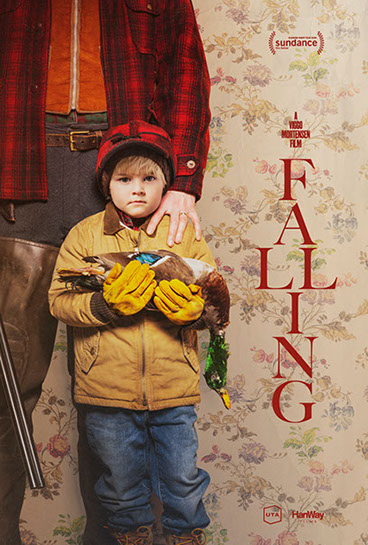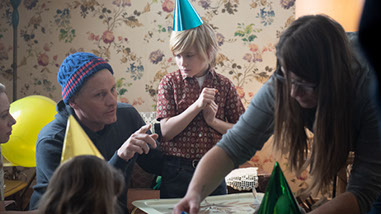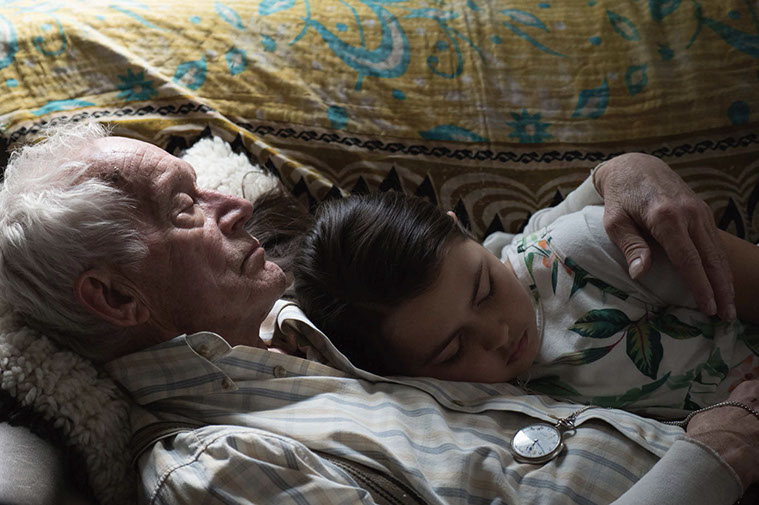Director’s Statement:
The idea for FALLING came to me as I was flying across the Atlantic after my mother’s funeral. I couldn’t sleep; my mind was flooded with echoes and images of her and our family at different stages of our shared lives. Feeling a need to describe them, I began to write down down a series of incidents and snippets of dialogue I recalled from my childhood. The more I wrote about my mother, the more I thought of my father. By the time we landed, the impressions I’d been writing down had evolved to include conversations and moments that had not actually happened, parallel story lines that felt right somehow, that widened my perspective. It seemed as though these invented sequences allowed me to get closer to the truth of my feelings for my mother and father than any straightforward enumeration of specific memories could. What I ended up with was a father-son story called “Falling”, about a fictional family that shares some traits with ours. I had the basic structure of what eventually became the present screenplay.
My father had been an overwhelming presence in my mother’s life, and their acrimonious separation when I was eleven years old, and my brothers were eight and six, changed the three of us profoundly. Our father's shadow hung over the new home we made with our mother for years after they'd both moved on and found other partners. He came to my mother's funeral in spite of having barely been on speaking terms with her for the previous forty-five years, and surprised me by coming to the reception and staying until most of the guests had left. He was in the early stages of dementia at that point, so I stayed close to him that day. My brothers did the same. We had put together a slide show of pictures representing various stages of our mother's life, and some of those included my father. He seemed very happy to see those faces and connections, and sat at the bar for a long while and watched the slide show repeatedly play out on the TV screen. At that time, he had already started to occasionally confuse me with his own father, slipping now and then into the distant past of his childhood and adolescence, speaking to me in Danish instead of English. While FALLING is not strictly an autobiographical story, some of its elements, including some of the flashbacks related to the childhood of John, the character I will be playing, are based on real events and conversations that I remember from my infancy.
In FALLING, Willis’ son John joins the Air Force and eventually settles down in Los Angeles with his partner Eric, where they adopt a little girl named Monica. The contrasts between John’s modern, urban family and Willis’ far more traditional lifestyle and nuclear family model are frequently extreme - and often a source of conflict and frustration for both of them. The dynamic of their relationship is driven by generational and geographical divides between a conservative, ageing farmer and what he views as his wayward, morally weak son. It is also a contrast between rural, heartland USA and West Coast urban progressive society. In the end, the damaged bonds of familial affection that once united them, and which the story visits through their differing subjective recollections, largely overcome the pain they have caused themselves and each other in the decades since John’s childhood. FALLING is, finally, a story about acceptance and forgiveness. A story about falling from grace and falling in love.
It is not my intention to draw parallels between the story’s father-son conflict and the current polarised state of affairs in US politics and society. That is, in part, why the story is set in the winter of 2009, long before the presidency of Donald Trump and the upsurge of socio-cultural divisiveness it has fuelled.
FALLING is structured with frequent looks at the past, often showing differing recollections of significant family events from Willis’ and John’s points of view. These contrasting glimpses of their shared history are to be filmed in colour, just as the present-day sequences will be. Although this is a story that focuses on intimate family scenes for the most part, our cinematographer Marcel Zyskind and I feel that the best way to take a clear and unflinching look at the father-son relationship at the heart of the story is by shooting widescreen, with the high resolution that anamorphic lenses provide. There are not going to be any visual “tricks” - any black and white photography, grainy or sepia-toned footage - to visually separate the flashback scenes from the actual winter that Willis and John are sharing. As happens sometimes with people who reach their seventies and eighties, Willis recalls the past as being simpler, easier, somehow more attractive. His memories mostly take place in summer and autumn months, and therefore those scenes will naturally look and feel more colourful and warmer than the bleak, wintry landscapes of late 2008. With the help of our gifted Production Designer Carol Spier, someone I got to know and admire on the three movie stories we worked together on with David Cronenberg, Marcel and I have already shot some of the summer and autumn material we need. Marcel has a wonderful eye for composition, and has connected strongly with the tone and rhythms of our story. We seem to be in sync visually, and I feel very fortunate to have him lighting our movie. We still have miles to go, of course, but I'm glad that we are well on our way.
The score, aside from the occasional radio or record player music described in the screenplay, will not seek to drive the emotional journeys of the characters in any obvious way. Ideally, any additional scoring will be sparse, closely linked to the landscapes the audience is exposed to, and supportive of the emotional through-lines of the principal characters, without calling undue attention to itself.
Lance Henriksen is an extraordinary actor, and his own life story - specifically his relationship with his father - in many ways mirrors our story’s father-son dynamic. He deeply understands and connects with the expectations, disappointments and stubborn optimism depicted in FALLING. I am very happy that he will be our ‘Willis’. To play the younger version of the character, we have enlisted a very fine actor, Sverrir Gudnason, who also feels a deep kinship with the character of ‘Willis’. With their help, our team of storytellers hopes to surprise and be surprised in the months of shooting to come.
Viggo Mortensen



